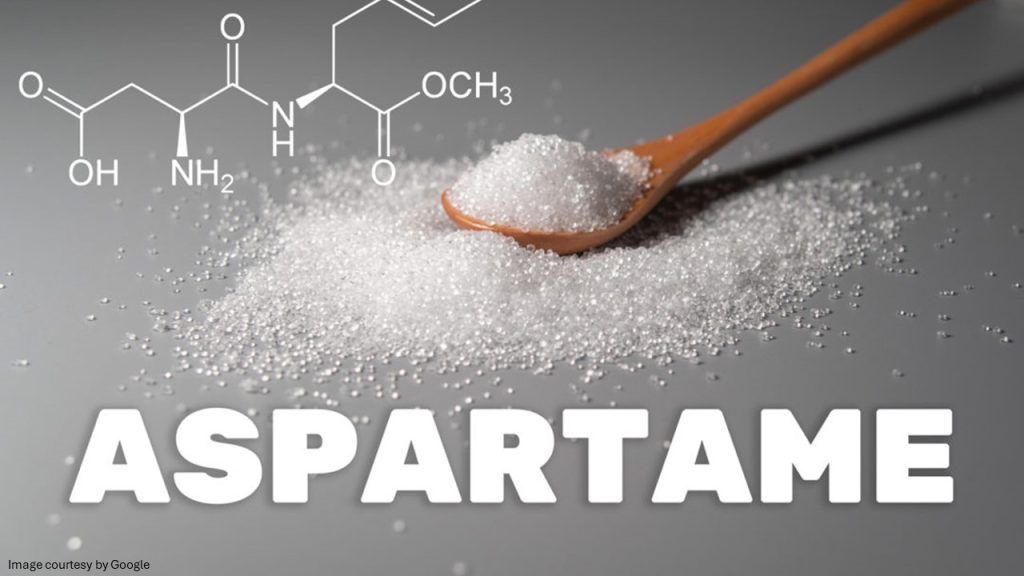People search for multiple options to stay fit. The most effective way is to cut down your sugar intake. Doing this can help people lessen their chances of getting diabetes and becoming overweight or obese. These two conditions can lead to serious health issues.
To combat the side effects of sugar, scientists have developed artificial sweeteners.
Aspartame is a commonly used artificial sweetener that tastes sweet and is without calories. It is widely used among the current generation. However, there are invisible side effects of taking aspartame that people are unaware of. Some side effects of aspartame include Alzheimer’s or Parkinson’s disease, symptoms that mimic multiple sclerosis, some cancer types, and dizziness.
What is aspartame?
Aspartame is an artificial sweetener that is about 200 times sweeter than sugar and is almost calorie-free. It is being used as a sweet alternative to sugar in more than 6,000 consumer foods and drinks under the trade names Equal and NutraSweet2. In 1965, a chemist, James M. Schlatter, discovered aspartame. He first used aspartame as a food additive in the US and some European countries in the early 1980s.
Despite approval from around the world, aspartame remains controversial as a food additive. Aspartame is an ingredient found in all kinds of diet foods and toothpaste. Moreover, some of the products that include aspartame are as follows:
- Cereals
- Frozen desserts
- Sugar-free chewing gums
- Diet soda and other soft drinks
- Gelatins
- Milk drinks
- Instant coffees and teas
- Market Yoghurt
- Tabletop sweeteners
Aspartame is also found in pharmaceutical drugs and supplements. However, aspartame isn’t as suitable for cooking and baking as other sweeteners, as it loses much of its sweetness when exposed to heat. The popularity of aspartame has decreased due to a few factors, like changing consumer preferences and harmful health effects.
When aspartame enters the body
When a person consumes aspartame in any form, it dissolves into the solution and travels throughout the body, deposited within any tissue. The body digests aspartame and then breaks it down into three substances:
- Phenylalanine (50% aspartame)– Phenylalanine is an amino acid found in the brain and is necessary for producing neurotransmitters for brain functioning. However, people with the genetic disorder PKU (phenylketonuria) aren’t able to break down this amino acid, which may lead to an excess of phenylalanine in the brain, causing brain damage.
- Aspartic acid (40% of aspartame)– Aspartic acid is an amino acid that raises the blood plasma level of aspartate and glutamate when taken in its free form. The levels of neurotransmitters in certain areas of the brain become high and lead to damage. Moreover, the excess of glutamate and aspartate slowly destroy neurons, and most neural cells in the area of the brain are killed before the symptoms of chronic illness are noticed.
- Methanol (10% of aspartame)– When the methanol group of aspartame encounters the enzyme chymotrypsin, methanol is released in the small intestine. Methanol is a deadly poison that gets rapidly absorbed by the body when taken in. Free methanol is created from aspartame when heated to above 30 Centigrade. Then methanol breaks down into formaldehyde in the body, which is a deadly neurotoxin and is widely known as a carcinogen, causing retinal damage and birth defects. Some of the symptoms of methanol poisoning include headaches, nausea, ear buzzing, gastrointestinal disturbances, weakness, chills, memory lapses, and numbness.
Disadvantages of aspartame:
Below are various disadvantages of using aspartame, these are as follows:
- Weight gain
- Obesity
- Neurologic problems
- Cognitive problems
- Diabetes
- Alzheimer’s or Parkinson’s disease
- Symptoms that mimic multiple sclerosis
- Some cancer types
- Headaches/migraines
- Dizziness
- Seizures
- Muscle spasms
- Rashes
- Nausea
- Numbness
- Depression
- Fatigue
- Vision problems
- Hearing loss
- Irritability
- Insomnia
- Heart palpitations
- Breathing problems
- Anxiety attacks
- Joint pain
If aspartame is used regularly, health problems such as those mentioned above are likely to affect people. But, in today’s world, almost all processed food or drinks contain aspartame. So, what is the solution? Avoiding processed foods altogether is the only solution to avoid aspartame.
How to avoid aspartame?
You can avoid aspartame by opting or switching to homemade meals. Furthermore, always read the labels before purchasing food products. To avoid aspartame, try to choose healthy sweeteners like:
- Raw honey—Raw honey is thick and cloudy in appearance. It has a granular consistency and is among the safest sugar substitutes, as it does not contain aspartame. It is beneficial because it requires no processing or heating. It contains antioxidants, vitamins, and minerals.
- Stevia leaves – Another option to avoid aspartame is stevia leaves. These are the most suitable alternative sugar substitutes to aspartame. Stevia leaves are natural, contain almost zero carbohydrates, and do not affect blood sugar levels.
Using the alternatives mentioned above helps you maintain your health, wellness, and satisfaction.
Final words: Now that you have the facts and alternatives, don’t put yourself at risk.
Max Jones
Latest posts by Max Jones (see all)
- How to Revive Your Sex Life - October 27, 2023
- Smoking and Asthma - October 20, 2023
- 10 Causes Of Erectile Dysfunction You Probably Didn’t Know About! - June 29, 2023




